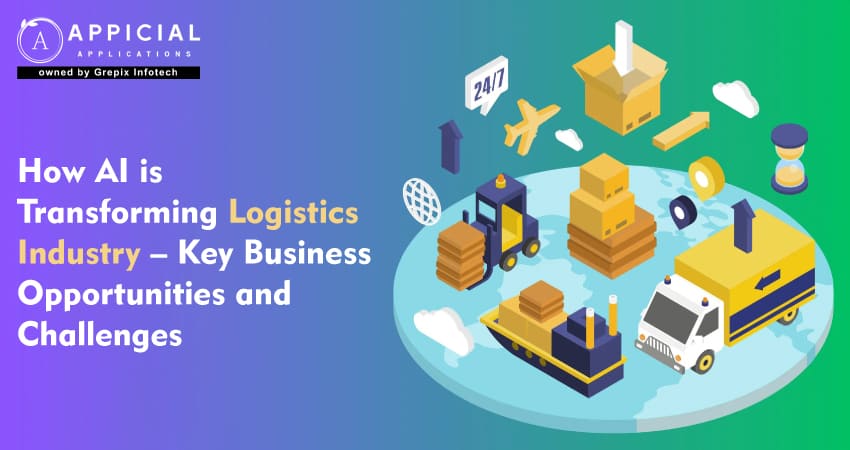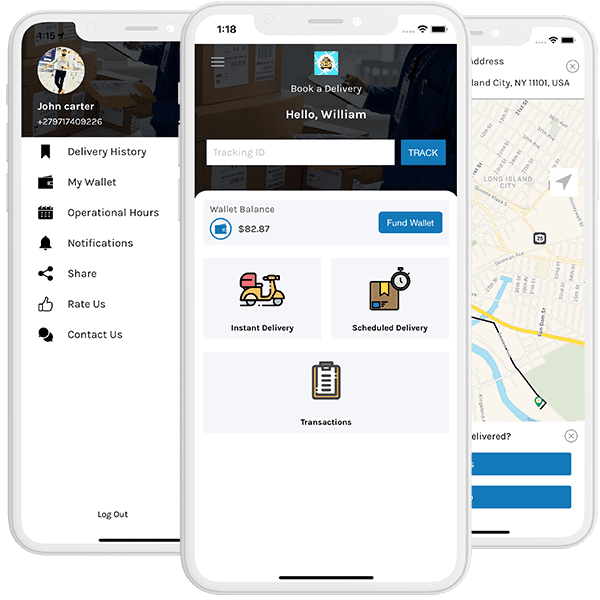
How AI is Transforming Logistics Industry – Key Business Opportunities and Challenges
Artificial Intelligence (AI) is rapidly reshaping the logistics industry, introducing significant business opportunities and challenges that promise to redefine supply chain management, operational efficiency, and customer satisfaction. This exploration will delve into how AI is influencing the logistics landscape, highlighting key areas of transformation, emerging business opportunities, and the challenges companies face as they integrate this advanced technology.
Artificial Intelligence (AI) is dramatically transforming the logistics industry, enhancing efficiency, reducing costs, and creating innovative service opportunities. AI facilitates predictive analytics for precise demand forecasting, optimizes delivery routes for quicker and eco-friendly operations, and automates warehousing with superior accuracy and throughput. Additionally, it improves customer service with real-time tracking and automated responses, greatly enhancing user satisfaction. While these advancements promise substantial business growth and competitive advantage, they also bring challenges like significant initial investments, data security concerns, talent shortages, regulatory uncertainties, and integration complexities. Successfully navigating these hurdles will be crucial for companies aiming to leverage AI for logistical excellence and sustainability.
Transformation of the Logistics Industry through AI
AI's impact on logistics is profound and multifaceted, significantly enhancing capabilities across several core areas. It revolutionizes demand forecasting, optimizes delivery routes, automates warehouse operations, and elevates customer service. These advancements streamline operations, improve efficiency, and offer competitive advantages in the rapidly evolving logistics sector.
1 Predictive Analytics for Demand Forecasting
AI utilizes historical data and real-time inputs to accurately predict future demand, enabling businesses to optimize inventory levels effectively. This capability helps prevent overstock and stockouts, leading to significant cost savings and enhanced service levels. Such precision in inventory management is crucial for maintaining efficiency and customer satisfaction.
2 Route Optimization
AI algorithms enhance logistics by analyzing traffic patterns, weather conditions, and vehicle status to determine the most efficient routes. This optimization not only accelerates delivery times but also reduces fuel consumption and cuts overall operational costs, boosting both environmental sustainability and economic efficiency.
3 Automated Warehousing
Robotics and AI systems are transforming warehousing operations by efficiently picking, sorting, and storing goods surpassing human capabilities. These systems operate continuously, reducing errors and achieving higher throughput, which enhances overall productivity and operational efficiency in logistics environments.
4 Enhanced Customer Experience
AI enhances logistics by enabling real-time shipment tracking, giving customers immediate updates on their orders. Advanced AI systems streamline customer service by autonomously handling inquiries and complaints, providing 24/7 support without human intervention, thus improving responsiveness and customer satisfaction.
Also Read: AI in Logistics: Transforming the Future of Seamless Supply Chain Management
Key Business Opportunities
The integration of AI into logistics unlocks numerous business opportunities, including significant cost reductions, enhanced scalability, and data-driven decision-making. These advancements lead to more efficient operations, the ability to handle increased volumes without a proportional rise in costs, and the capability to offer innovative, personalized services. The integration of AI into logistics offers multiple business opportunities:
1 Cost Reduction
AI greatly reduces logistics app costs by automating processes and optimizing routes. These efficiencies lead to substantial savings in labor, fuel, and inventory management, streamlining processes and reducing overheads. This transformation not only boosts profitability but also enhances service delivery and operational agility.
2 Improved Scalability
AI systems excel at managing and analyzing vast data volumes far more efficiently than humans, enabling businesses to scale operations significantly without corresponding increases in overhead. This capability supports more robust and agile growth, optimizing performance across various logistical functions.
3 Data-Driven Decision Making
With AI, logistics companies can effectively harness big data for smarter decision-making. AI's rapid data processing and analysis capabilities enable the identification of trends, optimization of operations, and prediction of future patterns. This leads to more strategic, informed decision-making processes, enhancing efficiency and foresight in logistics management, ultimately allowing companies to stay ahead in a competitive market landscape.
4 Sustainability
AI plays a crucial role in making logistics operations more sustainable by optimizing routes and enhancing warehouse efficiency. These improvements not only streamline operations but significantly reduce the carbon footprint of logistics activities. As environmental concerns grow and regulatory demands for greener practices increase, AI's ability to deliver eco-friendly solutions becomes increasingly vital, aligning operational goals with global sustainability standards.
5 New Service Offerings
AI is revolutionizing logistics with new services like predictive maintenance for fleet vehicles, personalized delivery options, and improved supply chain visibility. These innovations not only enhance operational efficiency but also provide a competitive edge by meeting specific customer needs and expectations. As businesses strive to stand out in a crowded market, AI-driven solutions offer substantial advantages, driving customer satisfaction and business growth.

Challenges in Adopting AI in Logistics
Despite the promising opportunities, several challenges impede the full integration of AI into the logistics sector. These include high initial investment costs, complex data privacy issues, a significant talent gap, regulatory and ethical concerns, and difficulties integrating AI with existing systems.
1 High Initial Investment
Setting up AI-based systems in logistics requires substantial upfront investment in technology and infrastructure. This financial burden poses a significant barrier for small to medium-sized enterprises (SMEs), potentially limiting their ability to adopt and benefit from advanced AI solutions and maintain competitiveness in the industry.
2 Data Privacy and Security
The use of AI in logistics necessitates managing large volumes of data, including sensitive information. Ensuring the privacy and security of this data is critical but challenging due to the rising sophistication of cyber threats. Safeguarding against these vulnerabilities is essential for maintaining trust and operational integrity.
3 Talent Gap
The logistics sector faces a significant hurdle due to a growing talent gap in AI and machine learning. There is an urgent need for skilled professionals who can develop, implement, and maintain AI systems, making it a critical challenge for companies aiming to integrate advanced technological solutions into their operations.
4 Regulatory and Ethical Issues
As AI systems take on more decision-making roles, regulatory and ethical questions arise, particularly concerning liability in case of errors or accidents involving autonomous vehicles and drones.
5 Integration with Existing Systems
As AI systems assume greater decision-making roles in logistics, regulatory and ethical questions intensify, especially regarding liability for errors or accidents involving autonomous vehicles and drones. Addressing these concerns is crucial for advancing AI integration while ensuring safety and accountability in automated operations.
Conclusion
Artificial Intelligence is profoundly transforming the logistics industry by streamlining operations, reducing costs, and opening doors to innovative services. While challenges such as high initial investments, data security concerns, and a talent gap exist, the advantages of AI integration are substantial and pivotal for future growth. Businesses that adeptly navigate these challenges stand to gain significant competitive advantages in an increasingly dynamic market.
Appicial Applications is a leading logistics app development company offering cutting-edge AI solutions tailored to the logistics sector. By partnering with Appicial, companies can leverage advanced technologies like predictive analytics, route optimization algorithms, and automated warehousing systems. These solutions not only enhance operational efficiency and scalability but also improve customer satisfaction through real-time tracking and personalized services. As the logistics landscape continues to evolve, aligning with innovators like Appicial Applications will be essential for businesses aiming to thrive and lead in the era of AI-driven logistics.
Looking to launch your own logistics venture like Uber for Logistics? Try our innovative Logistics App, designed to make starting your logistics delivery business simple and efficient. Get started today with the easiest solution for your logistics needs.




